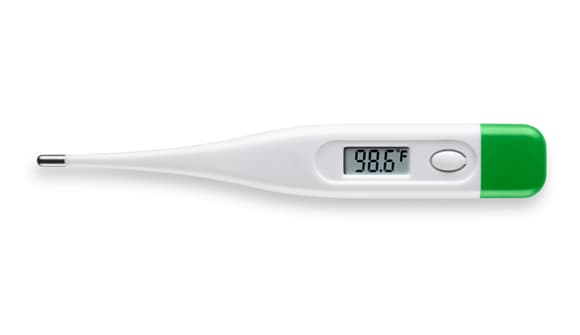Taking your temperature
How to get an accurate read from your thermometer.
Article Date:

Feeling a little under the weather? You might have a fever.
Before you break out the thermometer and chicken noodle soup, there are a few things to know about getting an accurate read of your body temperature. Kristie Vu, MD, internal medicine physician with Baptist Primary Care, shared some points to keep in mind if you decide to open up and say 'ahh' for an under-the-tongue temperature check.
What is considered a fever?
According to the Centers for Disease Control and Prevention, a fever is any body temperature above 100.4 degrees Fahrenheit. A mild fever can be treated at home by taking fever-reducing medication such as acetaminophen (Tylenol®) or ibuprofen (Advil®) and letting it run its course. However, call your doctor immediately if your temperature reaches 103 F or higher, or 102 F for infants and toddlers.
Normal temperature fluctuations
"A normal baseline body temperature is 98.6 F, but a few degrees higher or lower shouldn't be cause for alarm," Dr. Vu said. "Our internal temperature is lower in the early morning and higher in the evening, changing because of our activity levels."
While recovering from an illness, your body temperature can fluctuate up to two degrees every few hours. Temperature readings also vary by age and gender.
"Older adults don't develop fevers as often and may only feel slightly warm when battling infections," Dr. Vu said. "Throughout the menstrual cycle, women's body temperatures are affected by hormone levels; they can even rise by up to a degree after ovulation."
Choosing a thermometer
To get the best reading, Dr. Vu recommended using a digital thermometer, which she says is the fastest and most accurate way to take a temperature. These thermometers are available over the counter and can be used orally, rectally or under the armpit.
Ear thermometers measure the temperature inside the ear but should not be used on a child with an earache or a large amount of earwax buildup.
Forehead thermometers have become more popular due to the COVID-19 pandemic and take temperatures without contact, but they may not be as accurate as digital thermometers and are often more expensive. Avoid pacifier thermometers, strip thermometers, smartphone app thermometers and mercury glass thermometers.

Feeling under the weather?
Baptist Primary Care physicians are here for all of your health- and wellness-related needs, including fevers. Call 904.202.4YOU or visit fill out the request form to make an appointment.



